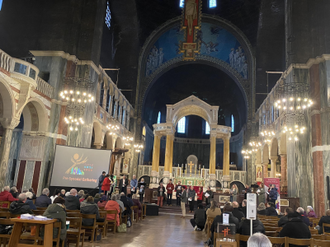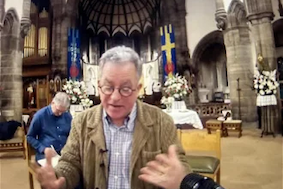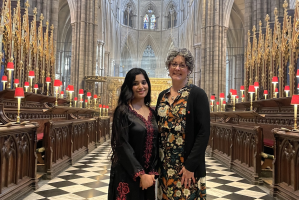How is the Synodal process going?

Recent Synod gathering in Westminster Cathedral (ICN report soon)
In October 2021 Pope Francis launched the Synod on Synodality. In parishes across the globe the People of God are currently engaging in a process of encounter, listening and discernment, submitting a synthesis of meetings to diocesan representatives, for inclusion in a joint discernment from the whole Diocese.
So, how's it going? The Ordinary General Council of the Synod of Bishops met at the end of January and on 7 February issued a progress report. The news was mainly positive, "The Church is on the move!" they reported, with the laity and consecrated life showing particular enthusiasm for the process. The report says that those who have been involved describe it as "an experience that brings joy and speak of a true transformation in their feeling of belonging to an ecclesial community."
To find out how the process is going in England and Wales I asked a group of lay Catholics from across the country about their experience of Synod. Is it bringing joy and transformation to them and their communities?
Lukas, a member of the LGBT+ group in the Archdiocese of Westminster explained that the group organised listening meeting sessions with prayer, meditation, and a safe sharing space for meeting in person and online. When I asked him if anything had surprised him about the meetings he said:
"Yes, the courage with which people express their fears, dreams and pastoral needs. I was brought up in very traditional Catholic setting where you listen to the Church and don't feel part of a living thing. Witnessing other expressing their longing for a different Church is a very liberating experience."
Most Dioceses have provided training for group facilitators and animators. The report from the Synod of Bishops stressed the need for formation, especially in listening and discernment, so that the Synod is an authentic spiritual process rather than a parliamentary style debate focused on a product or falls into the trap of becoming self-referential. People who'd had an opportunity to attend Diocesan training as facilitators said that it helped them organise successful meetings and communicate with their parish community and explain what the synodal process is all about.
Debs works for CAFOD. After some training, she invited a group of CAFOD supporters to an online synodal meeting by sending them four questions for consideration in advance along with an explanation of how the session would be a space for listening and discernment guided by the Holy Spirit. During the meeting a note taker wrote a summary of what was said. Debs was glad that she'd prepared herself and the group carefully,
"I was surprised by how open, objective and outward-looking this group was. How they listened, encouraged and supported each other even though they didn't all know each other. Their dreams for the church really resonated with me."
The report from the Synod of Bishops points out that many see the synodal process as a "crucial moment in the Church's life" and an opportunity for the "conversion and renewal of ecclesial life". Many of the people I spoke to see this as an opportunity for prayerful encounter and listening they've not had previously, and it awakened a desire to deepen the prayerful journey the process had begun within their own communities. More than one person remarked on how it had 'opened the floodgates', enabling a community to talk about church and their experience of it in a way they'd had not done before. Many commented on the importance of starting and ending meetings with prayer.
Meetings often started with reflections on the pandemic and how it has changed parish life. While there was a concern for friends who'd drifted away from the Church during the pandemic and not returned, there was also a feeling that the difficulties of lockdown had opened up other ways of being church. Theresa in Hexham and Newcastle Diocese commented on how the grotto and outside space around her parish church became a peaceful haven for church goers and non-church goers during difficult times.
The report also highlights challenges pointing out that "some are fearful and reticent and doubt that they'll be listened to". Organisers of parish meetings all commented on the honesty of those attending and their willingness to share the joys and sorrows of their faith journey with others. Although it's been made clear that Church doctrine is not up for discussion there was no avoiding discussing the effects of it. The issue of married clergy and women priests came up repeatedly, as well as a sense of dissatisfaction and frustration with the hierarchy and the institutional church and a sense that the laity are ignored. Stephen in Plymouth Diocese pointed out that, "All too often good ideas are applauded but actions to implement them are not followed through, will our ideas and thoughts be taken seriously?"
Meeting in person can be difficult to arrange at the best of times and the pandemic has made this even more difficult. Despite the Vademecum saying that: "The consultation of the People of God cannot be reduced to a mere questionnaire because the real challenge of synodality is, precisely, mutual listening and communal discernment," some parish newsletters and websites give the impression that the only way of engaging in the process is via a Diocesan online survey, or by sending responses to the parish office where a synthesis will be written on behalf of the community. Another respondent shared that his parish provided an opportunity to meet the parish representative after Mass for half an hour, he was the only person attending the meeting and was directed to a questionnaire on the parish website. On opening the webpage he found it was blank.
Reaching out to the housebound and digitally excluded was a challenge, Theresa telephoned people in this position, finding that they were glad to be remembered. Including young people is not easy but they bring a fresh perspective and vibrancy to a meeting. One person described how a new altar server started a parish meeting by articulating his hopes and dreams for a church of the future which provides for richly for young people.
Another challenge identified by the report is how to involve people who may feel on the margins, many wondering if their voices will be heard, Lukas summed up the concerns of many saying,
"We would like to be a beacon of hope for others feeling unwelcome in the Church so we could all walk together, in faith and without fear, knowing we are being moved by love bigger than ourselves.... My biggest fear is that the very challenging voices or those from margins might disappear amongst many others… we need to be bold and brave for the "difficult" opinions to not be censored but properly discerned within the Holy Spirit."
Other people I spoke to shared Lukas's feelings of hope and of the Holy Spirit being at work. At the same time taking part in something new and demanding requires boldness and a deep level of attentiveness. Despite differences of opinion and experience participants felt a strong sense of being held together by a shared faith and an instinctive sense for what is true. After participating in a meeting with her Diocesan Justice and Peace Commission and acting as a listener in her Parish group as well as the CAFOD group Debs reflected on all three saying,
"there definitely isn't 'one size fits all'. Each group was vastly different which really interesting. There is no such things as a 'typical' Catholic. We all come with our own experiences which can be so very different and enriching."
A parishioner from South Wales echoed Deb's comments remarking on the range of views in her parish. Although it was good that people felt able to express their differences this made writing a joint discernment difficult.
Discernment on the theme of a synodal church as a missionary church in which every baptised person plays in its life and mission led to a strong feeling that the laity need to play a more active role in the life and the mission of the Church. Thinking further on this topic some wondered about ways through which lay formation can take place. The group in South Wales discussed the possibility of lay led Lectio Divina for their parish, saying 'What emerges often surprises us.'
Gill from Plymouth Diocese pointed out that:
"We must remember that many priests would have thought it was their job to make all the decisions. Let's hope the clergy are pleased that some of the burden will be lifted from them. As baptised members of the Church we feel it is as much our duty to move the church forward as that of the clergy."
The report noted the reluctance of some clergy to participate. Hopefully Gill's goodwill and that flowing from parish groups will reassure priests who still feel unsure that a synodal Church is a Church within which we can all flourish.
If you've not had the opportunity to join a meeting and you'd like to contribute to Synod 2021-2023 it's not too late. You don't need to ask anyone's permission to meet with others to discuss the questions, to listen and discern together and to submit a joint or individual synthesis online to your Diocese. Responses can also be sent directly to your diocesan representative (link to CBCEW website diocesan reps list) or the Synod office in Rome. Office of the Synod of Bishops, Palazzo del Bramante, 00193 Roma, Via della Conciliazione, 34 synodus@synod.va
Finally, even if you miss taking part in Synod 2021-2023 it is just the start of a new way of being Church in which all have a part to play.
Jane Crone is from Clare Priory Parish in Suffolk. She works as a volunteer coordinatorfor CAFOD in the Diocese of East Anglia


















